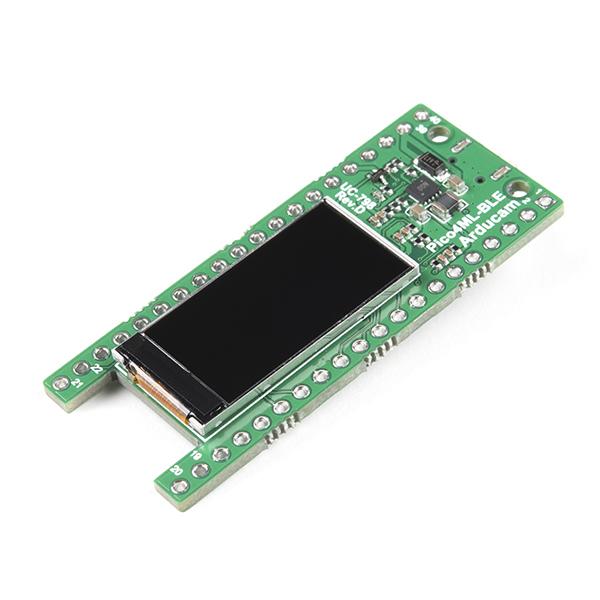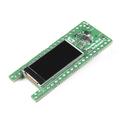Sparkfun Arducam Pico4ML TinyML Dev Kit

Description Attachments
The Arducam Pico4ML TinyML Dev Kit is a compact, single-board system that is energized by the Raspberry Pi RP2040 microcontroller. It is capable of running all Tensorflow Lite Micro tiny machine learning examples and has a QVGA camera module with ultra-low power consumption. This kit also includes a configurable 1-bit video data serial interface and a monochrome sensor for easy image processing in machine vision applications.
The Pico4ML TinyML Dev Kit is equipped with an audio chip that can output PDM (Pulse-density modulation) signals directly. This feature allows the RP2040 to receive audio input. The kit also includes a motion tracking feature with a 2.5 mW low-power 9-axis IMU.
There's a small TFT display on the back of the Pico4ML, a 160×80 LCD, which is connected to the board via the SPI interface. This allows for a live preview of the camera or a real-time display of the results of your machine learning models.
Arducam's Pico4ML is completely open-source. This means that all its codes, design files, and schematics are available for anyone to use, modify, or rebuild.
Features:
- Raspberry Pi RP2040 Microcontroller
- ICM-20948 Inertial Measurement Unit (low power)
- Mono channel microphone with direct PCM output
- Reset and Boot Buttons
- Camera Module: HiMax HM01B0, Up to QVGA (320 x 240)
- Screen: 2.44 cm LCD SPI Display (160 x 80, ST7735)
- Operating Voltage: 3.3V
- Current Draw: 40mA (standby), 60mA (running ML models)
- Input Voltage: VBUS: 5V +/- 10%, VSYS Max :5.5V
- Dimensions: 51 mm x 21 mm
Documents:
- Pico4ML User Manual
- Pico & Pico4ML Arducam Examples
- Schematic
- SPI Camera Driver for Pico
- Board 3D Model
- Enclosure 3D Model
Properties
Brand information
| Brand | Sparkfun |
| Model | DEV-18439 |
Size info
| Length | 80 mm |
| Width | 92 mm |
| Height | 36 mm |
| Weight | 117,5 g |
€ 37,85€ 31,25 Excl. VAT (NL)
Customer questions
Q
Customer Reviews
Sparkfun Arducam Pico4ML TinyML Dev Kit ★★★★★Click a star to leave your review
- Deal In stock -10 % Sparkfun Alligator Test Leads - Multicolored (10 Pack) € 6,50 € 5,85 View product
- In stock Sparkfun Teensy Stackable Header Kit (Extended) € 2,25 View product
- In stock Sparkfun RJ45 8-Pin Connector € 2,50 View product
- In stock Sparkfun Voltage Regulator - 3.3V € 3,- View product
- In stock Sparkfun Qwiic JST Connector - SMD 4-Pin (Vertical) € 1,- View product
- In stock Sparkfun Capacitor Ceramic 0.1uF € 0,55 View product
- Deal In stock -18 % Sparkfun Voltage Regulator - Adjustable LM1117 SMD € 2,- € 1,65 View product
- In stock Sparkfun Copper Tape - Conductive Adhesive, 5mm - 15 meter € 7,75 View product
- In stock Sparkfun Mini Power Switch - SPDT € 2,25 View product
- In stock Sparkfun Rotary Encoder - Illuminated (RGB) € 6,25 View product
- In stock Sparkfun Clear Plastic Knob € 1,50 View product
- In stock Sparkfun Silicone Electrical Tape - Pack of 10 Strips € 7,35 View product
- In stock SparkFun Micro 6DoF IMU Breakout - BMI270 (Qwiic) € 21,75 View product
- In stock Sparkfun Resistor Lead Bending Tool € 11,- View product
- In stock Sparkfun Hobby Motor - Gear € 3,50 View product










